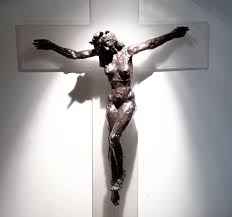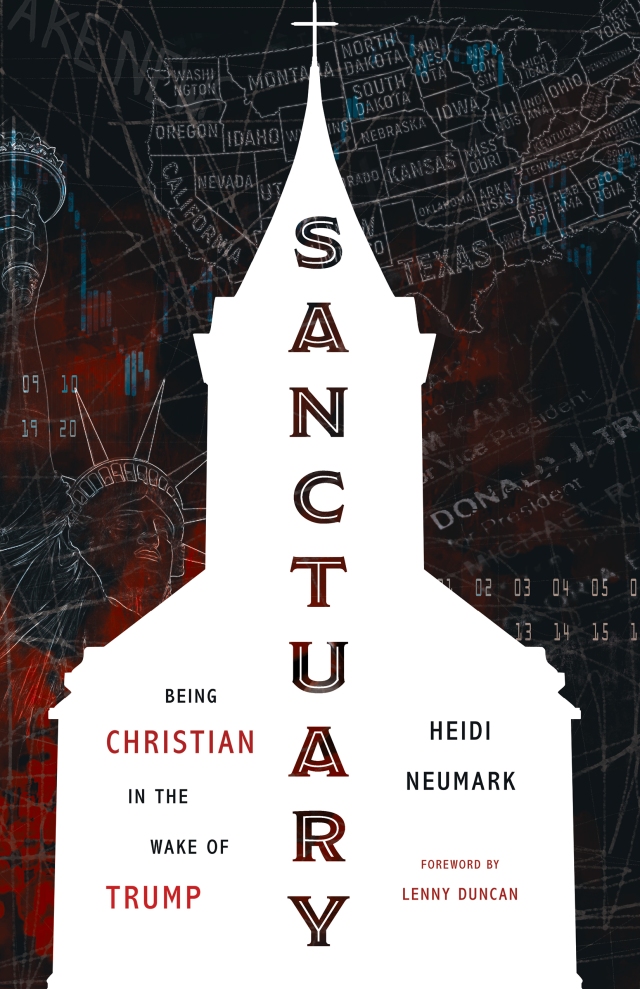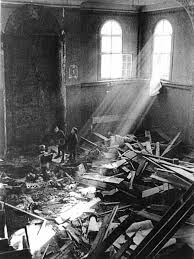
Who I am? This is the beginning of a poem written in a Nazi prison cell by the Lutheran Pastor Dietrich Bonhoeffer before his death by hanging. I’d like to share it with you today.
Who am I? They often tell me
I stepped from my cell’s confinement
Calmly, cheerfully, firmly,
Like a squire from his country-house.
Who am I? They often tell me
I used to speak to my warders
Freely and friendly and clearly,
As though it were mine to command.
Who am I? They also tell me
I bore the days of misfortune
Equally, smilingly, proudly,
Like one accustomed to win.
Am I then really all that which other men tell of?
Or am I only what I myself know of myself?
Restless and longing and sick, like a bird in a cage,
Struggling for breath, as though hands were
compressing my throat,
Yearning for colors, for flowers, for the voices of birds,
Thirsting for words of kindness, for neighborliness,
Tossing in expectation of great events,
Powerlessly trembling for friends at an infinite distance,
Weary and empty at praying, at thinking, at making,
Faint, and ready to say farewell to it all?
Who am I? This or the other?
Am I one person today and tomorrow another?
Am I both at once? A hypocrite before others,
And before myself a contemptibly woebegone weakling?
Or is something within me still like a beaten army,
Fleeing in disorder from victory already achieved?
Who am I? They mock me, these lonely questions of mine…
Who am I? This or the other? Am I one person today and tomorrow another?
Who among us has not experienced the kind of disconnect that Bonhoeffer describes so well. People know us and relate to us differently in different contexts. There are different sides to our identity or identities. Perhaps no one knows and sees all of our sides. And maybe we feel we need to hide parts of who we are depending on where we are because of how others might respond. Maybe if they saw certain sides of our identity, they would not like us, love us, accept us. Who am I? This or the other?
It may sound odd, but I think God knows what this is like. Just as we have a sinful tendency to want to put other people into boxes that make sense to us, we kind of like to put God in a box too. To define God in terms that make sense to us. To limit God according to our view of things, which is of course limited by our individual and social backgrounds.
The stained glass windows that are now in storage were created over 100 years ago by a white artist with a German background. Jesus looked quite white and German himself. The people who donated those windows and first enjoyed them would likely have been shocked and perhaps disturbed by the wall hanging from Haiti in the back of the church which shows a Black, Haitian Christ.
Imagining Christ wearing the features and skin of different races is something that more people are used to today as we have seen religious art from other parts of the world. But what about imaging Christ with skin pocked with the lesions of Kaposi’s sarcoma, a skin cancer associated with the early days of the AIDS epidemic. There are such images of Christ infected with full-blown AiDS and they are disturbing. Some people find them to be offensive. Why? Because of the way we like to categorize things. During communion we will sing the hymn Beautiful Savior: Fair is the sunshine. Fair is the moonlght, bright the sparkling stars on high. Jesus shines brighter. Jesus shines purer than all the angels in the sky. Well if Jesus shines purer than all the angels in the sky, Jesus cannot have AIDS. Because AIDS can still bring with it a stigma of guilt and shame. And Jesus is pure. AIDS can still draw some into the ugly shadows, but Jesus shines with beautiful, uncontaminated light. AIDS bad. Jesus good. This is how we like to sort and categorize.
Today is what the church calls Christ the King Sunday. As I pointed out last year, Christ the King Sunday did not exist before 1925 when Pope Pius 11th wanted to challenge the abuse of authority he felt was rampant in the 1920’s. He hoped that a Sunday devoted to the Kingship of Christ would help address this problem. Well that didn’t seem to have worked very well… And we’re not even Catholic, so we don’t need to adopt the decrees of any pope. But for some reason Lutherans, along with many other denominations, got on the bandwagon of Christ the King Sunday.
In Today’s Gospel Jesus is introduced as the Son of Man and a king. But the people in the story do not recognize him. Why is that? It is because a king is imagined in a very specific way. A king dresses a certain way, A king lives a certain way. A king is a very rich, powerful adult, male. A king as popularly imagined, and certainly at the time the gospel was written, is definitely one of the one percent.
Obviously a king is not a man in rags picking through the garbage for cans to sell. Obviously a king is not a transgender woman. Obviously king is not a starving Sudanese child. Obviously a king is not behind the bars of a woman’s prison. But in today’s gospel, Jesus presents himself as king AND as being all of these people, people across a full spectrum of genders and ages and races who have in common one thing, they find themselves on the margins. They are not the 99 percent. They are at the bottom of the 99 percent. The very opposite of a rich, powerful adult male.
People who have no trouble viewing an image of Christ on the cross wearing a crown can become very upset at an image of Christ covered in the lesions of Kaposi’s sarcoma or Christ as a woman on a cross, sometimes called Christa. I would say that such images are faithful, visual representations of today’s gospel where Christ the king says, “what do you mean you didn’t see me? I was hungry, I was sick, I was in prison. I was naked. I was a stranger.” In picturing God, the church has, for the most part, taken the image of king and discarded the rest. Making God over in our worldly image of power, God as a white man in a crown on a throne.
Of course, most of us don’t really imagine God like that..and yet….when I said last year that since this is a Sunday to show how Jesus redefines power, exploding our normal categories of what is and is not powerful, perhaps we should celebrate Christ the Queen Sunday instead of Christ the King Sunday, I got some pushback. One person suggested it was not Biblical. Where does the Bible suggest that Jesus was a Drag Queen? Point taken. A few others placed themselves among feminists who find Drag Queen culture to be offensive because men dress up as an exaggeration of an oppressive idea of what a woman should be… a woman with big boobs, in a tight sparkly dress and 7 inch heels. I agree that it is offensive to feel that to be a real woman you must possess such a body type and rock such an outfit. But another thing to consider is to see Drag Queen culture as making a mockery of such a stereotype. Here, you want to see a real woman? Actually, she’s a man! But not always. They may be gender queer. Those who dress in drag are breaking out of the gender box people want to put them in but, in going to the other extreme, making a defiant parody of the whole thing, of the way our society likes to define and confine us in strict gender roles, body types and clothing.
Drag artists work hard to shake it up. To do gender-bending things. And so did Jesus. Jesus himself often said and did shocking things on purpose because people needed to be shaken out of stereotypes and boxes they like to use sort people by, to control others and to feel superior to others. The story in today’s gospel is a good example. It’s shocking. Jesus’ own disciples don’t recognize him because of his body type and clothing. God does not belong in a starving body. God does not belong in an imprisoned body. God does not belong in a diseased body. And yet, that’s where God is, says Jesus. When Jesus said “the first shall be last and the last shall be first,” his words had shock value. And Jesus intended them to. Likewise when he called a group of religious leaders “a brood of vipers” and said that they those who think they can see are really blind. Likewise for the sayings we call the beatitudes: Blessed are the poor The meek shall inherit the earth. To us, it sounds rather lovely, but in fact, these were and are shocking statements. Jesus used actions in the same way—in the temple when he kicked over tables and took out a whip. When he washed his disciples’ feet. He was acting in shocking ways that disturbed people’s expectations of what is holy, proper and acceptable.
Jesus turned either/or categories inside out and upsidedown: blind/seeing, sick/well, pure/impure. rich/poor. slave/free. And from the moment of his birth: human/divine. Of course, this was not just being shocking for the sake of being shocking. Jesus was breaking open labels and boxes, dualities that caused all kinds of human misery. Jesus rebelled against ways of defining people that dehumanized people.
We have seen the tragic misery of young people (and adults) who commit suicide because they just don’t fit into the categories their peers, their family and society seem to value. Most of us thankfully do not reach such a desperate point, but few people go through life without ever knowing what it feels like to not fit in in one way or another and it’s often not a good feeling.
It’s an interesting coincidence that today, Nov 20th has been designated as Transgender Day of Remembrance. A day set aside to memorialize those who have been murdered due to anti-transgender hatred or prejudice. One of the first young people in our shelter came to us was a transgender woman who was beaten so badly that she sustained permanent brain damage. While she was here, she also needed reconstructive facial surgery. All of the transgender youth who stay here report being harassed on the street. One young man told me of being chased by teenagers in Riverside Park. They were throwing branches that had fallen from the trees in a storm and yelling: “What is it?” The transgender people who are remembered today are those who have been so dehumanized that their killers thought it was OK to attack them. They have paid the ultimate price for not fitting in. For not playing by the rules.
As did Jesus. On the cross. Jesus paid the ultimate price for refusing the identities others wanted to impose upon him. Ie If he is good, then he must shun these people. If he is male, then he must oppress those people. If he is holy, he must not touch her, or him, or them. If he is the Messiah, come down off the cross and save himself.
But Jesus sought to form a community where all people could experience their belovedness as children of God. A belovedness not based on our merits, our anatomy, our sexual orientation, our gender preference, our appearance, our IQ, our racial makeup, or anything else but only and ever only the love of God, a love that breaches every border, even the defining lines between heaven and earth, human and divine, to embrace us all.
King? Queen? What gender is the body of Christ? What gender is the church? None. And all. It doesn’t matter. Queer theology and our baptismal theology have a lot in common. Queer theology moves beyond the imposition of restrictive labels—gay, straight, bi, intersex, androgynous, and so does Jesus. Jesus was about building a different community, what Martin Luther King called the beloved community and what the gospels often call the Kingdom of God. But that language brings us back to kings and even switching to queens is not helpful. Perhaps we might call it the kindom of God, the place where all are kin, because all are related in the love that embraces us and gathers us together.
It is this kindom, this beloved community into which we are born through baptism. Even from the start, the church recognized that baptism gives us a deep, true identity that trumps everything else. Paul tried to express this in his letter to the Galatians where he wrote: There is no longer Jew or Greek, there is no longer slave or free, there is no longer male and female; for all of you are one in Christ Jesus. Imagine that! St Paul giving birth to this queer, baptismal idea, there is no longer male and female. St. Paul as the mother of queer theology!
Christ the King Sunday is much easier at Wee Worship. All you have to do is let each child put on a crown and they feel special. We make it so much more complicated but really, that’s what God wants for all of us, to feel the specialness of being beloved children of God. Wherever we fall on whatever spectrum of identity people devise for us, we are beloved children of God.
That’s what we seek to teach and sing and pray and grow into here at Trinity as we seek to live out Christ’s kindom: feeding the hungry, housing the homeless, welcoming all. If you believe in the value of such a church, I urge you to reflect upon your giving to Trinity in the coming year. If you can increase your giving, even a little, please do. We need it to strengthen and extend the embrace of our ministries even further. If you cannot, you are no less beloved. We are all kin here.
When I read Bonhoffer’s poem before, I left out the last line. I’ll read through to it now.
Who am I? This or the other?
Am I one person today and tomorrow another?
Am I both at once?
Whoever I am, You know, 0 God, I am Yours! And that’s what makes all the difference.




